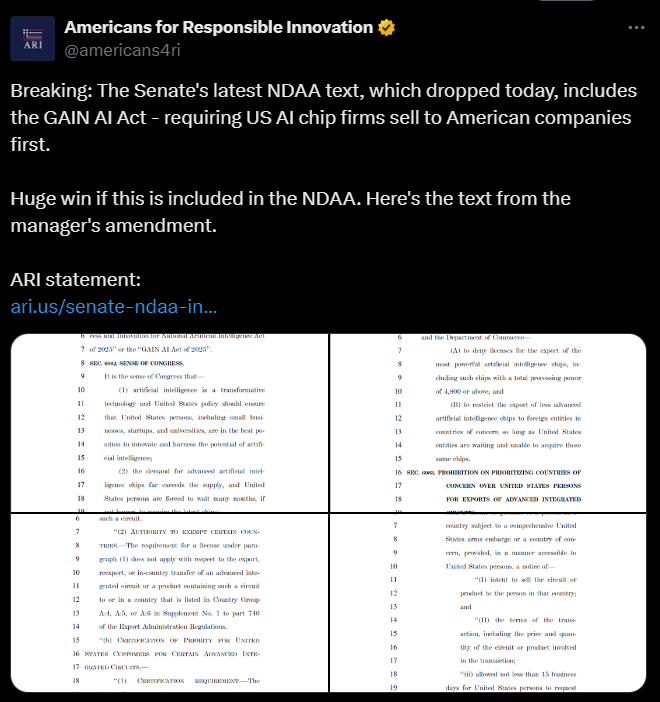The U.S. Senate has unveiled a preliminary version of its annual defense policy package, which includes sweeping restrictions on the export of advanced artificial intelligence (AI) processors. The proposed legislation, known as the Guaranteeing Access and Innovation for National Artificial Intelligence Act of 2025 (GAIN AI Act), would require companies such as Nvidia and AMD to prioritize domestic buyers before supplying high-performance AI chips to overseas clients. It also explicitly calls for a ban on exporting the most powerful GPUs.
Lawmakers say the measure aims to ensure that U.S. small businesses, start-ups, and universities receive priority access to cutting-edge AI hardware, ahead of customers in allied countries as well as rivals like China. However, industry analysts warn that if passed, the bill could significantly reduce overseas revenues for American chipmakers.
"Advanced AI chips are the jet engine that will enable the U.S. to lead in AI for the next decade," said Brad Carson, president of Americans for Responsible Innovation (ARI). "With global supply already constrained, every chip sold abroad is one that cannot accelerate U.S. R&D and economic growth. Including the GAIN AI Act in the NDAA would be a major win for U.S. competitiveness and national security."
Under the proposal, exporters would need to certify that U.S. customers had first refusal rights, that no domestic backlog exists, that exports would not delay U.S. supply, and that foreign buyers are not receiving more favorable terms. If any of these conditions are unmet, licenses must be denied.

The bill also sets strict technical thresholds for what qualifies as "advanced AI processors." Chips meeting any of the following criteria would fall under export control:
A total processing performance (TPP) score of 2,400 or higher, with GPUs above 4,800 banned from export entirely.
A performance density (PD) metric above 3.2.
DRAM bandwidth exceeding 1.4 TB/s, interconnect bandwidth above 1.1 TB/s, or combined bandwidth over 1.7 TB/s.
Such definitions would cover current-generation processors like Nvidia's HGX H20 and L2 PCIe, as well as AMD's Instinct MI308. More advanced GPUs, including Nvidia's H100 — which carries a TPP score of 16,000 — would be completely barred from foreign sales.
The proposal has already sparked debate within the industry. Critics argue that restricting exports could backfire, shrinking global markets for U.S. firms. In response to speculation, Nvidia stated that shipments of its H20 chips to China do not affect its ability to supply H100, H200, or Blackwell GPUs to domestic customers.
"The rumor that H20 reduced our supply of either H100/H200 or Blackwell is categorically false — selling H20 has no impact on our ability to supply other NVIDIA products," the company said in a statement.
If passed and signed into law, the GAIN AI Act would represent the most aggressive attempt yet by U.S. lawmakers to keep next-generation AI hardware within national borders, reshaping both the semiconductor industry and global AI development.
+86 191 9627 2716
+86 181 7379 0595
8:30 a.m. to 5:30 p.m., Monday to Friday
